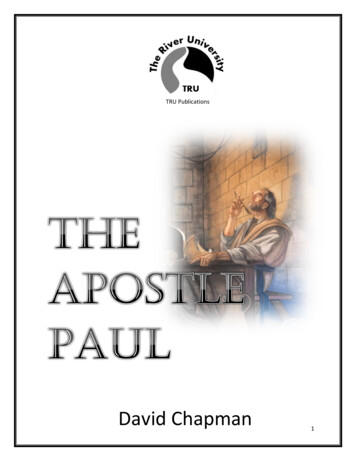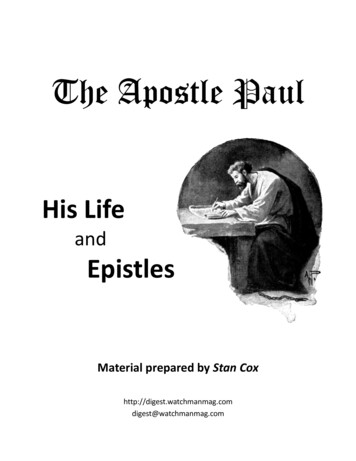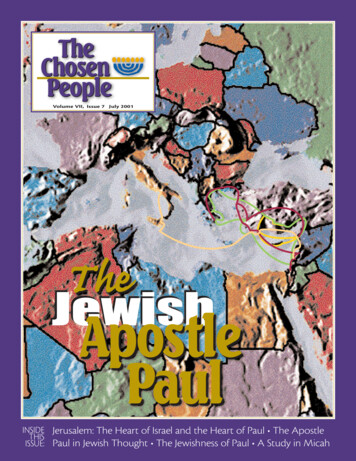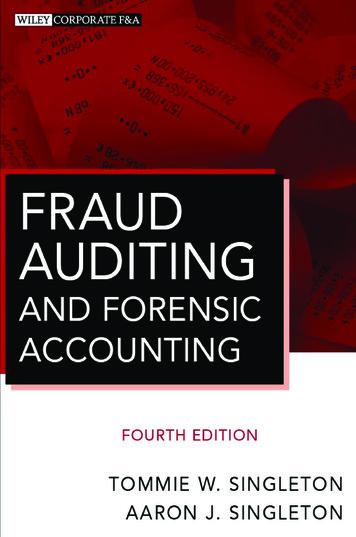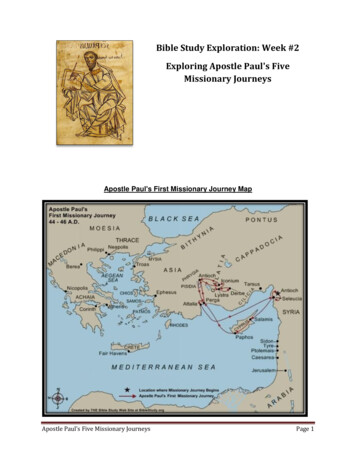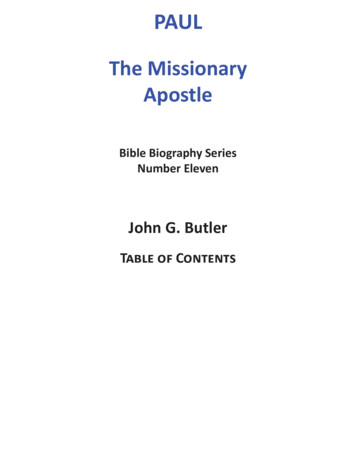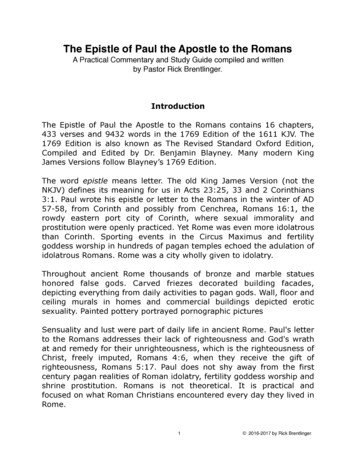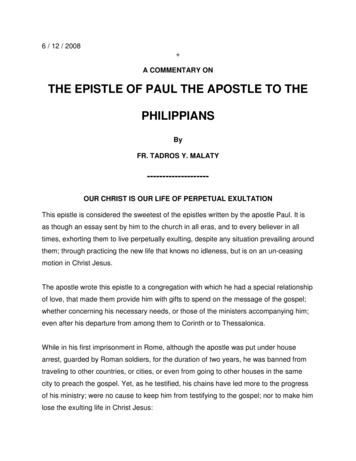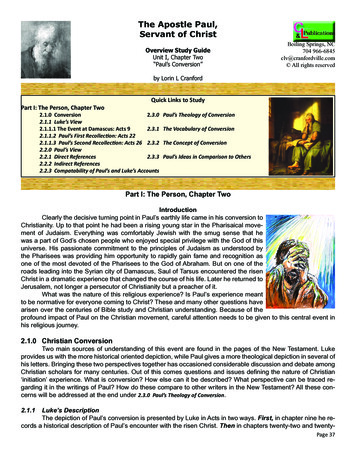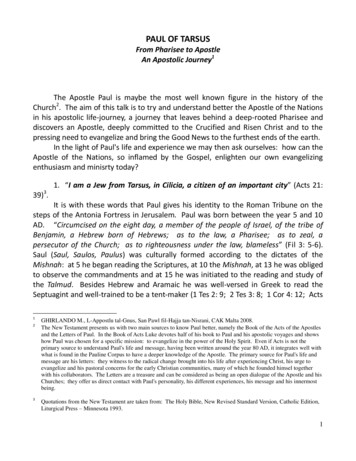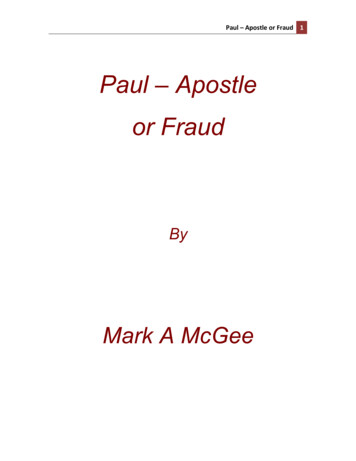
Transcription
Paul–ApostleorFraud1Paul – Apostleor FraudByMark A McGee
2GraceLifeMinistriesChaptersIntroduction . 3Starting at the Beginning . . 7Paul Is or He Isn’t . . 13Against Paul . . 19Paul’s Connections . . 28What About Peter?. 34What About The Apostles?. . . . 50Why Bother?. 58The Opposition . . 74The Challenge . . 83Summation . 139
Paul–ApostleorFraud3Introduction“Paul is not essential. He’s not a requirement to be a Christian.”“You only have Paul’s word for being a ‘light to the gentiles’ and let’sface it Paul was known as a liar, he said so.”“Jesus never tells us to follow Paul. Paul tells us to follow Paul.”“Paul did not meet the criteria for being an apostle, therefore hewasn’t one except through his own mouth.”“Why did none of the other apostles or disciples of Jesus everactually call Paul an apostle?”“No, the early Church did not accept Paul. He was utterly rejected bythe Ephesians, even Paul testifies to that. Ephesus found him to be afalse apostle and a liar.”These comments probably appear strange on a Christian apologeticsblog, but they are quotes from recent online discussions I’ve had withpeople who believe the Apostle Paul was a fraud. Was he? Are noneof his epistles to churches of any worth to followers of Christ? Whatabout the the Gospel of Luke and Acts of the Apostles? Are they also
4GraceLifeMinistriesfraudulent?I first came across people who didn’t believe Paul was a legitimateapostle of Christ about 40 years ago. However, the anti-Paulsentiment has been around for a lot longer than that. It goes all theway back to the 1st century AD.“Am I not an apostle? Am I not free? Have I not seen JesusChrist our Lord? Are you not my work in the Lord? If I am not anapostle to others, yet doubtless I am to you. For you are theseal of my apostleship in the Lord.” 1 Corinthians 9:1-2People who believe Paul was a fraud seem to be in agreement thatsome of the writings of the New Testament should not be there. Theyare in general agreement that all of Paul’s letters are fraudulent. Mostalso agree that 2 Peter is also a fraud. That’s convenient for themsince 2 Peter 3:15-16 supports Paul’s apostleship. There is somedivergence of opinion from there. Some of the anti-Paul group believethat all of the Gospels are Scripture, including Luke’s Gospel, somedon’t. I find that interesting since Paul mentored Luke. Some whoaccept Luke don’t accept John’s Gospel. Many of those people alsodon’t accept John’s letters and Revelation. They are anti-Paul andanti-John. It’s a bit hard to keep up with all of the different nuances ofwhat they do and don’t accept as being God’s Word.
Paul–ApostleorFraud5Some of the anti-Paul group don’t accept Luke’s Acts of the Apostleseven though they do accept Luke’s Gospel account. Others acceptthe first several chapters of Acts, but not after chapter 6 becausePaul is introduced in chapter 7. Do they believe that Acts 7 – 28 is notpart of God’s Word because of some textual reason? Not that I’veseen. The main reason seems to be that the rest of Acts is prettymuch about Paul and they believe Paul is a fraud, so what Lukewrote must be fraudulent. I do wonder why they would trust Luke atall in Acts or in his Gospel account if they think he’s a liar and party toa fraud about Paul. That’s not logical. Luke wrote a long narrative tohis friend Theophilus that began in Luke 1 and ended in Acts 28. Whytrust any of it if you believe Luke is a liar and manipulator? There isno reason to believe that Luke was a liar and fraud, but if you believethat at least be consistent. If you believe Luke was a liar and fraud,then you can’t and won’t accept either one of his narratives toTheophilus.For the person who does not accept Luke, Acts, 2 Peter, Hebrewsand all of Paul’s letters, I don’t think there’s anything anyone can doto help you. You’ve chosen to throw out every possible piece ofevidence that would tell you anything about Paul. That’s like a trialjudge who disallows every piece of evidence that would prove thedefendant not guilty just because the judge does not want thedefendant found not guilty. The court is stacked against the person inthat case. The same is true in the way many people handle the
6GraceLifeMinistriesevidence for Paul’s apostleship. If the evidence could possiblysupport Paul’s legitimacy as an apostle of Jesus Christ, they throw itout. That’s not reasonable, logical, ethical or legal, so there’s nothingI can do to convince you because your mind is made up and closedto the possibility of being wrong. You have come to the table ofdiscussion with presuppositions, preconceptions and thick ear plugs.You do not want to know, so you won’t know.However, if you have questions about whether Paul was an apostleor a fraud and you’re open to looking at all of the evidence, then wecan look at the evidence together and see what’s there. Once youhave seen all of the evidence you can make your own informeddecision about Paul. From talking with many anti-Paul people andreading their literature for years I’m convinced they have not seen allthe evidence, have incorrectly interpreted the evidence they haveseen and are closed to looking at it with fresh eyes and open minds.
Paul–ApostleorFraud7Starting at the BeginningThe evidence for Paul’s legitimacy as an apostle of Jesus Christbegins in the Gospel of Luke. Luke wrote an extraordinary narrativeto a Greek friend for the purpose of explaining what happened inIsrael 2,000 years ago.“Inasmuch as many have taken in hand to set in order anarrative of those things which have been fulfilled amongus, just as those who from the beginning were eyewitnessesand ministers of the word delivered them to us, it seemed goodto me also, having had perfect understanding of all things fromthe very first, to write to you an orderly account, most excellentTheophilus, that you may know the certainty of those things inwhich you were instructed.” Luke 1:1-4Luke is clear from the first sentence of his Gospel account that hewas doing what many other people had done – “to set in order anarrative of those things which have been fulfilled among us.” Thoseothers may have included Matthew and Mark. Luke’s Gospel hasbeen known for centuries as an excellent account of the life, deathand resurrection of Jesus Christ and to be synoptic with Matthew andMark’s Gospel accounts.
8GraceLifeMinistriesLuke continued his narrative about the events in the life of JesusChrist in what we know as The Acts of the Apostles.“The former account I made, O Theophilus, of all that Jesusbegan both to do and teach, until the day in which He wastaken up, after He through the Holy Spirit had givencommandments to the apostles whom He had chosen, to whomHe also presented Himself alive after His suffering by manyinfallible proofs, being seen by them during forty days andspeaking of the things pertaining to the kingdom of God.” Acts1:1-3Luke established clearly in the early part of Acts that Jesus Christ andthe Holy Spirit were in charge of what was going to happen inJerusalem, Judea, Samaria, and the rest of the world. Jesuspromised His disciples they would “receive power when the HolySpirit” came upon them, and that they would be “witnesses to Me inJerusalem, and in all Judea and Samaria, and to the end of theearth.” (Acts 1:8) Jesus, acting in His High Priestly and PropheticOffice, spoke and it was done. The Holy Spirit came upon thedisciples in Jerusalem and the preaching of the Gospel began (Acts2-3).Thousands of people were saved on the first day of preaching. Theycontinued steadfastly in the apostle’s doctrine, in fellowship, breakingof bread and in prayers. Fear came upon every soul, and manywonders and signs were done through the apostles. All who believed
Paul–ApostleorFraud9were together, and had all things in common. They sold theirpossessions and goods, and divided them among all the people, asanyone had need. They continued daily with one accord in theTemple. They broke bread from house to house, ate their food withgladness and simplicity of heart, praising God and having favor withall the people (Acts 2:41-47).Peter was the primary preacher from the beginning of this newmovement of the Spirit of God in response to the prophecy of Son ofGod, Jesus Christ. What was Peter’s message? That the Jews hadkilled the Messiah and God had raised Him from the dead.“Men of Israel, hear these words: Jesus of Nazareth, a Manattested by God to you by miracles, wonders, and signs whichGod did through Him in your midst, as you yourselves alsoknow— Him, being delivered by the determined purpose andforeknowledge of God, you have taken by lawless hands, havecrucified, and put to death; whom God raised up, having loosedthe pains of death, because it was not possible that He shouldbe held by it.” Acts 2:22-24“Therefore let all the house of Israel know assuredly that Godhas made this Jesus, whom you crucified, both Lord andChrist.” Acts 2:36“The God of Abraham, Isaac, and Jacob, the God of ourfathers, glorified His Servant Jesus, whom you delivered up and
10GraceLifeMinistriesdenied in the presence of Pilate, when he was determined tolet Him go. But you denied the Holy One and the Just, andasked for a murderer to be granted to you, and killed the Princeof life, whom God raised from the dead, of which we arewitnesses.” Acts 3:13-15“Then Peter, filled with the Holy Spirit, said to them, ‘Rulers ofthe people and elders of Israel: If we this day are judged for agood deed done to a helpless man, by what means he hasbeen made well, let it be known to you all, and to all the peopleof Israel, that by the name of Jesus Christ of Nazareth, whomyou crucified, whom God raised from the dead, by Him this manstands here before you whole. This is the‘stone which wasrejected by you builders, which has become the chiefcornerstone.’ Nor is there salvation in any other, for there is noother name under heaven given among men by which we mustbe saved.” Acts 4:8-12“But Peter and the other apostles answered and said: ‘Weought to obey God rather than men. The God of our fathersraised up Jesus whom you murdered by hanging on a tree. HimGod has exalted to His right hand to be Prince and Savior, togive repentance to Israel and forgiveness of sins. And we areHis witnesses to these things, and so also is the Holy Spiritwhom God has given to those who obey Him.” Acts 5:29-32
1Paul–ApostleorFraud1What did Peter tell the Jews to do because of what they had done toJesus Christ?“Repent, and let every one of you be baptized in the name ofJesus Christ for the remission of sins; and you shall receive thegift of the Holy Spirit. For the promise is to you and to yourchildren, and to all who are afar off, as many as the Lord ourGod will call. And with many other words he testified eneration.” Acts 2:38-40“Repent therefore and be converted, that your sins may beblotted out, so that times of refreshing may come from thepresence of the Lord, and that He may send Jesus Christ, whowas preached to you before, whom heaven must receive untilthe times of restoration of all things, which God has spoken bythe mouth of all His holy prophets since the world began.” Acts3:19-21The tension is powerful in Jerusalem. Peter is preaching, the apostlesare working wonders and miracles, the people are being saved andfollowing the teaching of the apostles. The Jewish rulers are arrestingPeter and the other apostles and demanding that they stop preachingin the Name of Jesus Christ. Peter and the others refuse to obey the
12GraceLifeMinistriesJewish rulers. Even though the rulers beat the apostles andthreatened them, Peter and the apostles “daily in the temple, and inevery house, they did not cease teaching and preaching Jesus as theChrist.” (Acts 5:42) The rulers wanted to kill the apostles and beganto plot how they could do it without causing themselves problems withthe citizens of Jerusalem who were excited about the new Messianicfervor surrounding the preaching of the apostles.That is the tension that brings us to Paul, known first as Saul ofTarsus.
1Paul–ApostleorFraud3Paul Is or He Isn’tJesus told His disciples to do everything He commanded them to doand if what Paul wrote to the churches includes the commands ofJesus Christ, we must obey them. However, if Paul was not anapostle of Christ and was in fact a fraud, then we must not do whathe wrote in his epistles because they are a lie and do not contain thecommands of Christ. Whether we include Paul’s writings into ourchurches and our lives is all based on certain historical facts whichcan be verified. In other words Paul is who he said he is or he isn’t.We need to figure out which one is the truth.When we last saw Christ’s apostles in Acts 5, the Jewish rulers hadbeaten and threatened Peter and the others not to preach in theName of Christ again. The first thing Peter and the other apostles didwas to “daily in the temple, and in every house, they did not ceaseteaching and preaching Jesus as the Christ.” Some of the rulerswanted to kill Peter and the apostles; other rulers did not want to dothat. However, the plot to stamp out the apostles’ movement wasunderway.
14GraceLifeMinistriesMembers of the Synagogue of the Freedmen secretly induced men tofalsely accuse one of the newly chosen “deacons” (Stephen) ofspeaking blasphemous words against Moses and God. They stirredup the people, the elders, and the scribes, then seized Stephen andbrought him to the council of elders. They set up false witnesses whosaid, ‘This man does not cease to speak blasphemous words againstthis holy place and the law; for we have heard him say that this Jesusof Nazareth will destroy this place and change the customs whichMoses delivered to us.”(Acts 6:13-14) The high priest turned toStephen and asked him if those things were so. Stephen spokeeloquently about Israel’s history of disobeying God, then said this:“You stiff-necked and uncircumcised in heart and ears! YoualwaysresisttheHolySpirit;asyourfathers did, so do you. Which of the prophets did your fathersnot persecute? And they killed those who foretold the coming ofthe Just One, of whom you now have become the betrayersand murderers, who have received the law by the direction ofangels and have not kept it.” Acts 7:51-53The people who were listening to Stephen were cut to the heart. Theygnashed at him with their teeth, but Stephen, “being full of the HolySpirit, gazed into heaven and saw the glory of God, and Jesusstanding at the right hand of God, and said, ‘Look! I see the heavensopened and the Son of Man standing at the right hand of God!” (Acts7:55-56) The people were so angry that they “cried out with a loudvoice, stopped their ears, and ran at him with one accord; and they
1Paul–ApostleorFraud5cast him out of the city and stoned him. And the witnesses laid downtheir clothes at the feet of a young man named Saul.” (Acts 7:57-58)We have just met Paul (Saul) for the first time. He is described as a“young man.” It appears he may have some position of responsibilityor authority because the witnesses to the stoning of Stephen laid theirclothes at Saul’s feet. We learn more about him in the next sentencesin Luke’s narrative to Theophilus.“Now Saul was consenting to his death. At that time a greatpersecution arose against the church which was at Jerusalem;and they were all scattered throughout the regions of Judeaand Samaria, except the apostles. And devout men carriedStephen to his burial, and made great lamentation over him. Asfor Saul, he made havoc of the church, entering every house,and dragging off men and women, committing them to prison.”Acts 8:1-3Paul (Saul) had both responsibility and authority from the Jewishrulers and his job was to put an end to the Messianic uprising led byPeter and the other apostles. Saul was motivated by righteous anger.“Then Saul, still breathing threats and murder against the disciples ofthe Lord, went to the high priest and asked letters from him to thesynagogues of Damascus, so that if he found any who were of theWay, whether men or women, he might bring them bound toJerusalem.” (Acts 9:1-2) Saul received the letters he needed and
16GraceLifeMinistriesheaded for Damascus. It was on the road to Damascus to carry outhis threats and murder against the disciples of the Lord that Saul metJesus for the first time.“As he journeyed he came near Damascus, and suddenly alight shone around him from heaven. Then he fell to the ground,and heard a voice saying to him, ‘Saul, Saul, why are youpersecuting Me?’ And he said, ‘Who are You, Lord?’ Then theLord said, ‘I am Jesus, whom you are persecuting. It is hard foryou to kick against the goads.’ So he, trembling andastonished, said, ‘Lord, what do You want me to do?’ Then theLord said to him, ‘Arise and go into the city, and you will be toldwhat you must do. And the men who journeyed with him stoodspeechless, hearing a voice but seeing no one. Then Saularose from the ground, and when his eyes were opened he sawno one. But they led him by the hand and brought him intoDamascus. And he was three days without sight, and neitherate nor drank.” Acts 9:3-9If you believe that Luke’s letters to Theophilus are true (Gospel ofLuke and Acts of the Apostles), then you must believe that Jesuschanged Saul’s heart on the road to Damascus. Saul didn’t ask tomeet Jesus. He didn’t want to meet Jesus. He wanted to arrest andkill people who believed in Jesus. Jesus wanted Saul. Jesus calledSaul by name, twice, and asked Saul why he was persecuting Him.What that means is Jesus saw Saul’s persecution of the apostles anddisciples as a personal persecution of Him. Saul’s life was changed
1Paul–ApostleorFraud7that day.Jesus also spoke to one of His disciples in Damascus; one of thepeople Saul wanted to arrest. By doing this, Jesus opened anintroduction for Saul into fellowship with His disciples, regaining of hissight and insight into what the Lord would have him do for the rest ofhis life.“Now there was a certain disciple at Damascus namedAnanias; and to him the Lord said in a vision, ‘Ananias.’ And hesaid, ‘Here I am, Lord.” So the Lord said to him, ‘Arise and go tothe street called Straight, and inquire at the house of Judasforone called Saul of Tarsus, for behold, he is praying. And in avision he has seen a man named Ananias coming in andputting his hand on him, so that he might receive hissight.’ Then Ananias answered, ‘Lord, I have heard from manyabout this man, how much harm he has done to Your saints inJerusalem. And here he has authority from the chief priests tobind all who call on Your name.’ But the Lord said to him, ‘Go,for he is a chosen vessel of Mine to bear My name beforeGentiles, kings, and the children of Israel. For I will show himhow many things he must suffer for My name’s sake.’ AndAnanias went his way and entered the house; and laying hishands on him he said, ‘Brother Saul, the Lord Jesus, whoappeared to you on the road as you came, has sent me thatyou may receive your sight and be filled with the Holy
18GraceLifeMinistriesSpirit.’ Immediately there fell from his eyes something likescales, and he received his sight at once; and he arose andwas baptized. So when he had received food, he wasstrengthened. Then Saul spent some days with the disciples atDamascus.” Acts 9:10-19Ananias became a bridge for Saul between who he was and who hewas to become. Ananias was also a witness to the disciples inDamascus that Saul was not pretending to be a disciple of Christ sohe could get into the inner circle and arrest and kill the apostles.Saul’s encounter with Jesus Christ on the road to Damascus changedhis life forever. As we will see further in the Acts of the Apostles, Saulwould never oppose Jesus again.
1Paul–ApostleorFraud9Against PaulPaul made it clear in his epistles that he was “an apostle of JesusChrist by the will of God” (Ephesians 1:1) and that he was speakingand writing what Jesus had revealed directly to him (1 Corinthians 9).So, for a group of Christians to deny that Paul was an apostle and todeclare his writings as fraudulent is a major problem.This is not the first time in the history of the Church that groups haveopposed Paul’s apostleship and questioned his writings. As wecontinue laying the historical foundation for answering seriousquestions by these groups, we will also look at the history of antiPauline theology.The problem between the Jewish leaders and the apostles anddisciples of Christ had been growing bigger for months and explodedwith the stoning death of Stephen, a deacon in the congregation ofChrist followers. Saul was a part of the crowd that stoned Stephenand was a leader in the great persecution of believers that followed.“At that time a great persecution arose against the churchwhich was at Jerusalem; and they were all scattered throughoutthe regions of Judea and Samaria, except the apostles. And
20GraceLifeMinistriesdevout men carried Stephen to his burial, and made greatlamentation over him. As for Saul, he made havoc of thechurch, entering every house, and dragging off men andwomen, committing them to prison.” Acts 8:1-3The result of that persecution was not what Saul or the Jewishleaders had intended.“Therefore those who were scattered went everywherepreaching the word.” Acts 8:4Instead of running wildly for their lives and hiding from Saul and thesoldiers from the high priest, the Christ followers preached themessage of Jesus everywhere they went. The remaining verses inActs 8 contain stories about what happened as they preached.As we saw in our last study, Saul was on his way to Damascus withletters from the high priest written to the synagogues of Damascusgiving Saul permission to arrest “any who were of the Way, whethermen or women” (Acts 9:2) so he could arrest them and bring thembound to Jerusalem.We also saw that Jesus interrupted Saul’s trip and blinded him with agreat light that “shone around him from heaven” (Acts 9:3) Saul hearda voice calling to him saying, “Saul, Saul, why are you persecutingMe?” (Acts 9:4) Saul asked the voice who He was and the Lord said,“I am Jesus, whom you are persecuting” (Acts 9:5).
2Paul–ApostleorFraud1Jesus told Saul to get up and go into the city where he would be told“what you must do” (Acts 9:6). The soldiers and others who were withSaul heard a voice but didn’t see anyone. Because Saul was blindthe soldiers led him by the hand into Damascus. Saul was blind forthree days and didn’t eat or drink. (Acts 9:7-9)The next event Luke wrote about was a conversation between JesusChrist and one of His disciples in Damascus. Question: how did Lukeknow what Jesus and Ananias talked about that day? Answer: Lukewas an excellent historian. The work of a journalist is also historical innature, so I understand how Luke got his information. In fact, he’salready told us.“Inasmuch as many have taken in hand to set in order anarrative of those things which have been fulfilled amongus, just as those who from the beginning were eyewitnessesand ministers of the word delivered them to us, it seemed goodto me also, having had perfect understanding of all things fromthe very first, to write to you an orderly account, most excellentTheophilus, that you may know the certainty of those things inwhich you were instructed The former account I made, OTheophilus, of all that Jesus began both to do and teach, untilthe day in which He was taken up, after He through the HolySpirit had given commandments to the apostles whom He hadchosen.” Luke 1:1-4; Acts 1:1-2
22GraceLifeMinistriesLuke did what historians do – he interviewed the people who madethe history. Luke said that he had “perfect understanding of all thingsfrom the very first” and used that understanding to write an orderlyaccount to Theophilus so he would “know the certainty of those thingsin which you were instructed.” One of the people Luke most likelyinterviewed was Ananias.It’s also important to remember that the Holy Spirit is at the center ofeverything going on in Israel, Samaria, Syria and other places whereHe spread the Gospel of Jesus Christ. The Spirit of God spokedirectly to those early believers, as we will soon see, and may havegiven information to Luke that he was not able to gain from personalinterviews.Jesus spoke to Ananias, who lived in Damascus, in a vision. TheLord told him to get and go to a “street called straight, and inquire atthe house of Judas for one called Saul of Tarsus, for behold, he ispraying.” Jesus went on to tell Ananias that Paul had already seenAnanias in a vision coming to put his hands on him so he couldreceive sight again. You might imagine Ananias’ response.“Then Ananias answered, ‘Lord, I have heard from many aboutthis man, how much harm he has done to Your saints inJerusalem. And here he has authority from the chief priests tobind all who call on Your name.” Acts 9:13-14
2Paul–ApostleorFraud3That statement by Ananias confirms Luke’s earlier information aboutPaul being an enemy of Christ and His followers. How Jesusresponded to Ananias give us great insight to the unique ministry Hehad planned for Paul.“But the Lord said to him, ‘Go, for he is a chosen vessel of Mineto bear My name before Gentiles, kings, and the children ofIsrael. For I will show him how many things he must suffer forMy name’s sake.” Acts 9:15-16Look at those words closely: he is a chosen vessel of Mine to bear My name before Gentiles before kings before the children of Israel I will show him how many things he must suffer for My name’s sakeWe’ve already seen that Jesus chose Saul of Tarsus on the road toDamascus. Now, we see that Saul (Paul) was a “chosen vessel ofMine.” That is an extremely personal phrase pointing to Paul’spurpose and position. Paul belonged to Jesus Christ and wouldperform the duties of a “chosen vessel.” The Greek is skeuos eklogesestin moi – literally, “a vessel of choice is to me.” The word for“vessel” (skeuos) means “container, implement.” The word for
24GraceLifeMinistries“chosen” (ekloges) means “the act of picking out, choosing.” Thewords for “is to me” (estin moi) carry the idea of personal choice.Jesus told Ananias that He chose Saul to be a container/implementfor Himself. The Lord made a personal choice that Saul would belongto Him and be useful as a container for His purpose.The work that Jesus purposed for Saul was “to bear My name.” Jesusintended for Saul to be His “chosen vessel” (container) to bear HisName “before Gentiles,” followed by “before kings,” and “before thechildren of Israel.” To top it off, Jesus said that Saul would “suffer forMy name’s sake.” Paul would suffer in his position as a “chosenvessel” for the Lord.When you look at the life that Saul (Paul) lived after his conversion,did it look anything like the life that Jesus prophesied to Ananias? If itdid, then Paul was obedient to his calling. If not, then Paul was notobedient. The words of Jesus to Ananias are key to whether Paulwas a true apostle of Christ or a fraud.Ananias went to the house where Saul was staying, entered thehouse and laid hands on him. Ananias accomplished four things inhis message to Saul: called him “brother Saul” that carried with it the powerful sense ofacceptance, inclusion and purpose reminded him of his encounter with the “Lord Jesus” on the road what happened to Saul on that road would forever be a
2Paul–ApostleorFraud5milestone in the life of Saul and the followers of Jesus Christ that Jesus sent Ananias to Saul so he could receive his sight theLord wanted Saul to see again physically, but see as a believerfor the first time. The last thing Saul would remember seeingbefore going blind was his blind anger against God. The firstthing Saul would remember seeing after his ‘Damascus road’experience would be a brother in Christ who accepted him andpartnered with him in the ministry Jesus had called him to do. and be filled with the Holy Spirit Saul would go from being ayoung Jewish rabbi who only knew God from a distance to afollower of the Way he had once persecuted having the verySpirit of God living inside him and filling him with His power andglory.Saul received his sight immediately when something like scales fellfrom his eyes. He arose, was baptized, received food, was strengthenand “spent some days with the disciples at Damascus.” Acts 9:18-19What happened next is quite remarkable. ”Immediately he preachedthe Christ in the synagogues, that He is the Son of God.” (Acts 9:20)Saul went from being an angry pharisee arresting God’s people tobeing one of God’s people preaching that Jesus Christ “is the Son ofGod.” What an amazing theological change was wrought in Saul.
26GraceLifeMinistriesThen all who heard were amazed, and said, ‘Is this not he whodestroyed those who called on this name in Jerusalem, and hascome here for that purpose, so that he might bring them boundto the chief priests?’ But Saul increased all the more instrength, and confounded the Jews who dwelt in Damascus,proving that this Jesus is the Christ.” Acts 9:20-22What caused this amazing change in Saul? Two things: he was filledwith the Holy Spirit and he spent time with the disciples at Damascus(Acts 9:17-19). We’re only into the first several days of Saul’s life as afollower of Jesus Christ and already the evidence is mounting in favorof the future of Pauline theology. Jesus revealed Himself personally to Saul on the road to Damascus Jesus revealed Himself personally to the disciple Ananias, verifiedthe call of Saul to a special ministry to Gentiles, kings and Jews Ananias the confirmed disciple of Christ met with Saul and told himwhat Jesus said about the ministry that Saul would have forChrist Ananias the confirmed disciple of Christ told Saul that Jesus hadsent him so that Saul would receive his sight and be “filled withthe Holy Spirit” Ana
“Paul did not meet the criteria for being an apostle, therefore he wasn’t one except through his own mouth.” “Why did none of the other apostles or disciples of Jesus ever actually call Paul an apostle?” “No, the early Church did not accept Paul. He was utterly rejected by the
